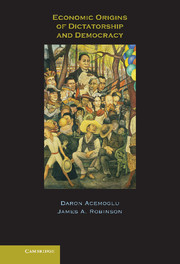Book contents
- Frontmatter
- Contents
- Preface
- PART ONE QUESTIONS AND ANSWERS
- PART TWO MODELING POLITICS
- 4 Democratic Politics
- 5 Nondemocratic Politics
- PART THREE THE CREATION AND CONSOLIDATION OF DEMOCRACY
- PART FOUR PUTTING THE MODELS TO WORK
- PART FIVE CONCLUSIONS AND THE FUTURE OF DEMOCRACY
- PART SIX APPENDIX
- Bibliography
- Index
4 - Democratic Politics
Published online by Cambridge University Press: 05 September 2012
- Frontmatter
- Contents
- Preface
- PART ONE QUESTIONS AND ANSWERS
- PART TWO MODELING POLITICS
- 4 Democratic Politics
- 5 Nondemocratic Politics
- PART THREE THE CREATION AND CONSOLIDATION OF DEMOCRACY
- PART FOUR PUTTING THE MODELS TO WORK
- PART FIVE CONCLUSIONS AND THE FUTURE OF DEMOCRACY
- PART SIX APPENDIX
- Bibliography
- Index
Summary
Introduction
In this chapter, we begin to analyze the factors that lead to the creation of democracy. As discussed in Chapter 2, our approach is based on conflict over political institutions, in particular democracy versus nondemocracy. This conflict results from the different consequences that follow from these regimes. In other words, different political institutions lead to different outcomes, creating different winners and losers. Realizing these consequences, various groups have preferences over these political institutions.
Therefore, the first step toward our analysis of why and when democracy emerges is the construction of models of collective decision making in democracy and nondemocracy. The literature on collective decision making in democracy is vast (with a smaller companion literature on decision making in nondemocracy). Our purpose is not to survey this literature but to emphasize the essential points on how individual preferences and various types of distributional conflicts are mapped into economic and social policies. We start with an analysis of collective decision making in democracies, turning to nondemocratic politics in Chapter 5.
The most basic characteristic of a democracy is that all individuals (above a certain age) can vote, and voting influences which social choices and policies are adopted. In a direct democracy, the populace would vote directly on the policies. In a representative democracy, the voters choose the government, which then decides which policies to implement. In the most basic model of democracy, political parties that wish to come to office attempt to get elected by offering voters a policy platform.
- Type
- Chapter
- Information
- Economic Origins of Dictatorship and Democracy , pp. 89 - 117Publisher: Cambridge University PressPrint publication year: 2005



